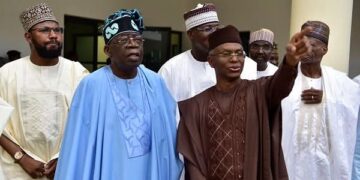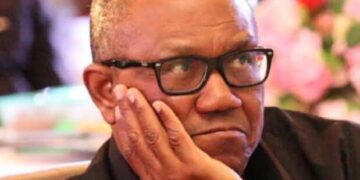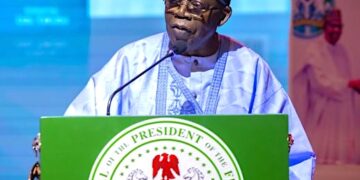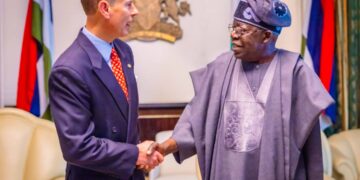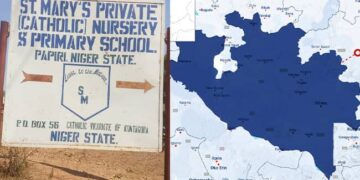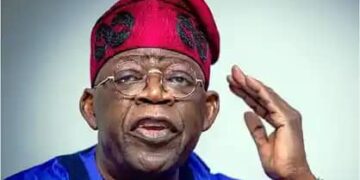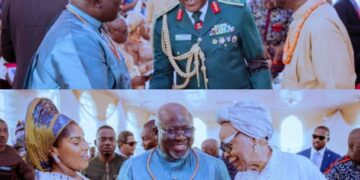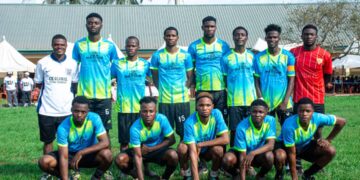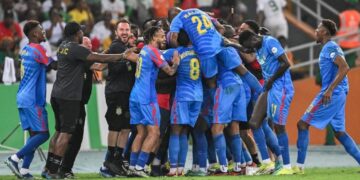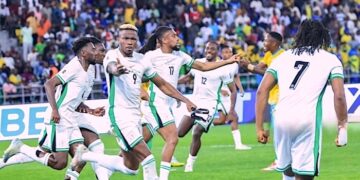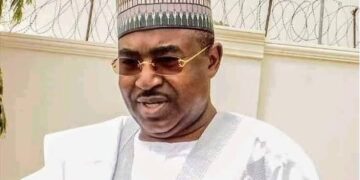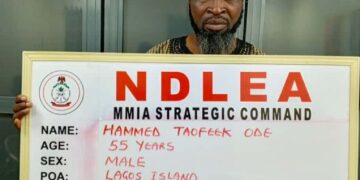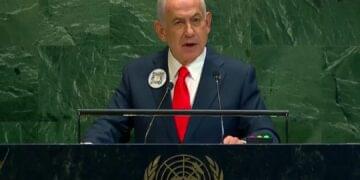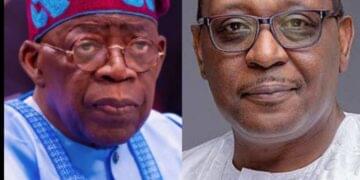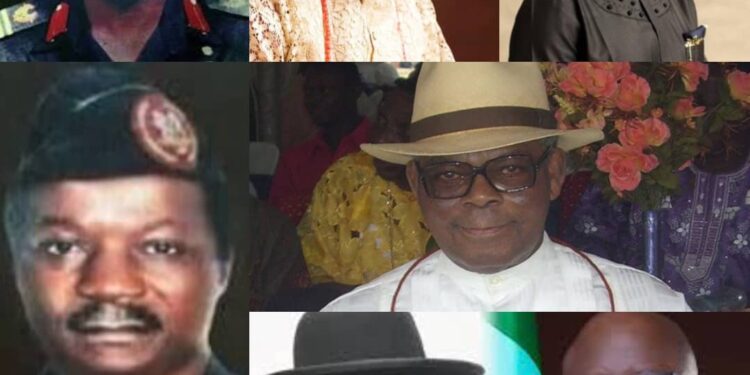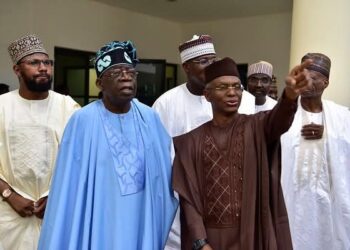Since its creation on August 27, 1991 by the administration of the self-styled evil genius, President Ibrahim Badamosi Babangida, Delta, aptly tagged Nigeria’s Big Heart, or, more recently, the Finger of God (the latter is the creation of the administration of Dr. Emmanuel Eweta Uduaghan), has been led by many individuals – in military/police garb and in civilian clothing.
The police/military leaders of the state held office during the military era, (when their postings were regarded as purely military engagements), while the civilians have held office in the civilian era.
In a chronological order of succession, the leaders of the state – both military/police and civilian – are:
(a) Group Capt. Luke Chijiuba Ochulor (fss, psc) (Aug 27, 1991 – Jan 2, 1992.
He was the pioneer leader of the state, following his appointment by the administration of Gen. Babangida. He laid the initial foundation for the development of the state and, quite understandably, faced many teething problems as a pioneer administrator operating from temporary structures, some of which were ranshackled.
He left office on January 2, 1992, following the inauguration of Chief Felix Ovudoroye Ibru as Governor of the state. Ibru, an architect of global reckoning, was elected on the ticket of the now defunct Social Democratic Party (SDP) and had beaten his opponent, Prof. Eric Agume Opia who vied on the platform of the equally defunct National Republican Convention (NRC).
(b) Chief Felix Ibru (Jan 2, 1992 – Nov. 17, 1993)
Olorogun Felix Ovudoroye Ibru was Delta State’s first elected civilian leader. He was in office for a little less than two years and is largely credited with the construction of the strategic Nnebisi Road, a major artery in the state capital, Asaba.
He left office following the November 17, 1993 coup of General Sani Abacha, which dismantled all democratic structures in the country, thus marking a return to military interregnum.
(c) Compol (Alhaji) Abdulkadir Shehu (Nov 20, 1993 – Dec. 12, 1993)
Alhaji Abdulkadir Shehu, a Commissioner of Police (Compol) succeeded Chief Felix Ibru. His role was mainly to stabilise the state in the wake of the public angst against the annulment of the June 12, 1993 presidential election (believed won by Chief Moshood Kashimawo Olawale Abiola of the SDP), the dismantling of all democratic structures in Nigeria, the effective overthrow of the Chief Ernest Shonekan administration- led Interim National Government (ING) and the return of military rule.
Shehu was in office for roughly three weeks.
(d) Col. Bassey Asuquo (Dec 12, 1993 – Sept.23, 1994)
(e) Group Capt. Ibrahim Kefas (Sept 26, 1994 – Aug 27, 1996)
(f) Col. John David Dungs (Aug 27, 1996 – Aug 14, 1998)
(g) Navy Capt Walter Feghabor (Aug 14, 1998 – May 29, 1999)
(h) Chief James
Onanefe Ibori (May 29, 1999 – May 29, 2003 (1st term) and May 29, 2003 – May 27, 2007).
The tenure of Chief James Onanefe Ibori marked the return of civil rule in both the state and the rest of the country.
Aside from signposting the return of civil rule, the administration of Chief Ibori was famous for its extensive rehabilitation of public primary and secondary schools in the state, the massive recruitment of public officers, especially teachers, the establishment of many schools, including the College of Physical and Health Education (COPHE), Mosogar – and the three polytechnics at Ogwashi-Uku, Oghara and Ozoro. It also laid a plethora of top grade infrastructural projects, including the strategic bridge at Omadino, the bridge across Ase creek and the navigational bridge across River Raymos at Bomadi.
Chief James Ibori was also architect and arrowhead of the resource control campaign under the aegis of which the people of the strategic Niger Declaration (South-South), sought a greater say in the use of the proceeds of the lucrative crude oil deposits in their ancestral land.
Ibiri is largely credited with creating and sustaining what his supporters call the Ibori political family which has largely been in power for much of the period since 1999.
(i) Dr. Emmanuel Eweta Uduaghan
Dr. Emmanuel Eweta Uduaghan hails from Abigborodo in Warri North local government area of the state was elected, just as Chief Ibori before him, on the ticket of the People’s Democratic Party (PDP) in the 2007 governorship poll.
Uduaghan’s administration was anchored on a three-point agenda of peace, infrastructure and human capital development.
He introduced reforms in the strategic health sector and implemented such revolutionary initiatives as free rural health care scheme, free maternal health care scheme for expectant mothers and free healthcare for under-five children.
His administration established the School of Marine Technology (SMT), Burutu, and built the flyover bridges in Asaba and Warri.
He also introduced the First Class Scholarship Scheme under which eligible Deltans accessed N5m each to study up to the doctoral degree in any university of their choice in any part of the world.
That policy has since been rested by successive administrations.
Uduaghan had two four-year terms of office just like his predecessor in office, though the first four-year term had an interruption, following a Court of Appeal (Benin) ruling nullifying his election. This judgment enabled the then Speaker of the Delta State House of Assembly (DTHA), Rt. Hon. (Prince) Sam Onyeka Obi, to hold forte as Acting Governor, between Nov. 10, 2010 and January 10, 2011).
His wife, Roli Nere Uduaghan, ran the pet programme, I care.
(j) Rt. Hon. (Prince) Sam Obi (Nov 10, 2010 – Jan 10, 2011), came into office as Acting Governor, following an Appeal court ruling that torpedoed the administration of Dr. Emmanuel Uduaghan. By that singular action, Sam Obi became the only person to have led the state without, being appointed by the military or elected directly as governor.
His government, though short-lived, was profiled by the rapid mobilization of contractors to attain set tasks and goals.
(k) Senator (Dr.) Ifeanyi Okowa
Elected into office on the ticket of PDP like his civilian predecessors in office, Senator (Dr) Ifeanyi Arthur Okowa was inaugurated into office on May 29, 2015, as the fourth directly elected civilian Governor of the state (after Chief Felix Ibru, Chief James Ibori and Dr. Emmanuel Uduaghan). He came into office unfolding the operational code of his administration which is SMART Agenda (later Stronger Delta).
Okowa, in the course of his administration, made some revolutionary moves in many sectors, including:
(i) Construction of more than 1,500km of roads in the first term and construction of storm water control projects in Asaba and Warri;
(ii) Completion and operationlisation of Stephen Keshi Stadium, Asaba;
(iii) Upgrade of College of Physical Education, Mosogar, to a full-fledged College of Education.
(iv) Creation and operationalisation of the Ministry of Technical Education;
(v) Establishment/operationalisation of the Delta State Board for Technical Education;
(vi) Initiating power deals with Luxra Nigeria Ltd, Yutai Li Nigeria Ltd and Bastanchury Power Solution Nigeria Ltd, the last of which is providing power for most public sector offices in and around Asaba;
(vii) Reopening/Establishment of more than 20 primary and secondary schools in the state;
(viii) Building of a new central secretariat project to house 28 ministries, departments and agencies that had been in rented apartments;
(ix) Training and empowerment more than 10,000 youths under the aegis of the job and wealth creation office which his administration also brought into being to tackle the death of viable skills in the youth segment of the state demography, as well as general unemployment;
(x) Introduction and implementation of the Delta State Contributory Health Scheme;
(xi) Restoration of the State Sports Festival and making it an annual event;
(xii) Restoration of the Headmasters’ and Principals’ Cup Soccer competitions among primary and secondary schools in the state;
(xiii) Operationlisation of the Delta State Transport Management Authority;
(ixx) Reconfiguration of Delta Line to give a private sector investor-God is Good – 60 per cent equity shareholding and the state government, 40 per cent;
(xx) Creation of Special Areas Development Agencies for Asaba, the state capital, and the Warri/Uvwie axis of the state for the purpose of their more coordinated and accelerated development, and
(xxi) Activation of the Department of Environmental Studies at Anwai Asaba Campus of Delta State University, (DELSU).
(xxii) Creation of three new state universities.
(L)Rt. Hon. Sheriff Oborevwori
(May 29,2023 till date)
Oborevwori came into office on a platter of historic feats.
He is the first Okpe man to be elected Governor of the state, and the first Speaker of the Delta State House of Assembly, DTHA, to be elected Governor of the state.
He is also the first Deltan to be elected Governor during the pendency of his term as Speaker of the DTHA , and the first elected Governor to proclaim the DTHA during the pendency of his Speakership.
Oborevwori was the longest serving Speaker of the DTHA, and the only Speaker to have presided over two assemblies of the DTHA.
He is the fifth elected governor of the state after Chief Felix Ibru, Chief James Ibori, Dr. Emmanuel Uduaghan and Dr. Senator Ifeanyi Okowa, and the fourth in the current democratic dispensation, after Chief James Ibori, Dr. Emmanuel Uduaghan and Dr. Ifeanyi Arthur Ozabor Okowa.
Oborevwori came into office with a development code called the MORE Agenda, under which aegis he is striving to significantly enhance the tempo of development of the state.
He has been in office for roughly two years, but has etched his legacies on the sands of time.
His legacies so far include the N78billion flyover bridges and road projects in and around Warri and Effurun; the establishment and operationalization of the School of Medical Sciences at the Southern Delta University, Ozoro; the establishment and operationalization of the Orerokpe campus of the university; the establishment and operationalization of the College of Nursing at Ovrode in Isoko: the completion and ongoing construction of more than 300 inherited and new road and drain projects; the payment of more than N6billion counterpart funding for the State Universal Basic Education programme; the payment of more than N5b promotion arrears benefit to public officers; the ongoing multi billion naira storm water project in Okpanam; the ongoing completion of the strategic trans Warri highway,; the ongoing completion of the Ughelli Asaba highway: the complete retrofitting of the Warri Stadium; the procurement and provision of more than 60 brand new operational vehicles for security agencies in the state; the prompt adoption and implementation of the new National Minimum wage; the recruitment of more than 600 personnel for the state higher schools; the recruitment of more than 3,000 teaching and other staff for the state basic education system: the approval of a new retirement age of 70 years for Associate Professors in the state ‘s tertiary education sector and the provision of grants to more than 200,000 persons in sundry areas of small scale industry.
His administration is also credited with repaying much of the huge backlog of inherited debts and contractual obligations, and for its high store on cost-efficiency.
It is also credited with assisting local governments in the state to access a N40 billion loan used to offset the huge backlog of pension and related benefits for retirees in the local government system in the state, the payment of a N30,000 per public officer over a three- month period, as palliative to cushion the harsh effects of the sudden removal of Petroleum subsidy by the Federal Government.
The administration has also introduced a ned work schedule under which public officers in the state are entitled to a two-day off duty privilege per week , in order to cushion the effects of the erasure of petrol subsidy by the Federal Government.

